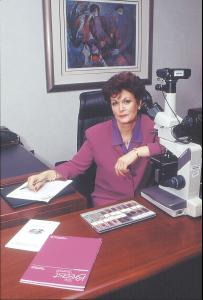Poor Benefit From New Pap Smear Program
A University of Florida researcher has launched a nationwide program that provides low-income women with a new tool in the battle against deadly cervical cancer.
The program, in turn, provides research data that will help determine if computerized Pap smear screening technology can assist in preventing cancer in women who sometimes do not have annual gynecological examinations.
Under the program, thousands of poor women will have their Pap smears double-checked with the help of a computer to make sure technicians --- who are looking for a needle in a haystack --- have caught all signs of abnormal cervical cells. The system is expected to reduce the problem of false negatives that inaccurately give women a clean bill of health when cancer may be developing.
Studies have indicated that, in the traditional Pap smear screening process, as many as a third of the cases of abnormal cells may be missed. If such cells are not treated, they could become cancerous. An estimated 15,700 American women will be diagnosed with invasive cervical cancer this year, and 4,900 women will die from it.
Neuromedical Systems Inc., developer of the PAPNET screening system, is making its test available free to indigent women who seek treatment at 10 academic health centers around the country during the next two years. UF's Health Science Center/Jacksonville is spearheading the program.
In the PAPNET process, laboratory technicians continue to conduct the first review of a Pap smear slide. If no abnormal cells are detected, however, it is subjected to further analysis. A PAPNET computer examines the slide and projects any suspicious-looking cells it detects onto a color video screen for another thorough review by a technician.
The U.S. Food and Drug Administration approved the system for commercial use last year.
Dr. Shahla Masood, associate pathology chairwoman and associate research dean at UF's Health Science Center/Jacksonville, approached NSI early last year with the idea of providing the test, which usually costs $40, to poor women.
``We felt it was our responsibility to make PAPNET available free of charge to women who will benefit from it but may not have the means,'' said Dr. Laurie Mango, NSI medical director.
Victoria White

photo by Russ Lante
Dr. Shahla Masood